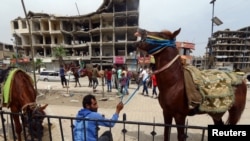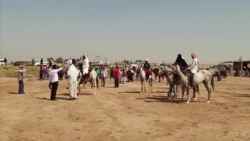After more than five years of neglect because of control of the region by the Islamic State, residents of Raqqa can finally enjoy their favorite sport — Arabian horse racing — in the northern Syrian city once considered to be the capital of the group's self-proclaimed caliphate.
Hundreds of men and children could be seen dancing and celebrating as 50 Arabian horses raced each other in a festival held late last week on the city's outskirts.
Spectators said the distinctive breed and the riders' equestrian skills offered a respite from the conflict that has been wreaking havoc in Syria since 2011.
Symbolic importance
Husam al-Din Hamad, one of the organizers of the event and the head of the Raqqa Arabian Horse Group, said staging the race has a great symbolic importance for the residents as they try to bring normalcy back to their city, which was nearly destroyed by the war against IS.
"Raqqa's horses are among the most elegant in the world. But unfortunately, in the past five to seven years, this sport was abandoned," Hamad told VOA.
Praising the pedigree of horses in the area, Hamad said he was heartbroken at the toll that had been taken on the horses. He said local officials needed to increase efforts to help the horses recover from the physical and psychological trauma of the war.
According to World Arabian Horse Organization, of nearly 8,500 horses that were registered by the group in 2011, as many as 3,000 were killed or stolen in the war. It reported that 72 stolen horses were recovered between 2017 and 2018.
In eastern Syria's regions, such as Raqqa, the organization found 2,200 horses in 2016-18. Of that number, 1,022 horses were freeze branded for visual registration in 2018.
"This is a heritage of our ancestors," Hamad said. "Raqqa governorate and its countryside is rich with this treasure. I hope this sport of our fathers and grandfathers, this wealth of pure Arabian horse, is maintained and well-supported."
Long history
Horse racing in Syria's northeastern desert has a long history, offering the Bedouin tribes a way to connect to each other through annual festivals where competitions are held. The tribes in the region are famous for maintaining purebred Arabian horse lines. The animals are celebrated for their beauty, stamina and speed.
Raqqa's Old City, which contains a complex of palaces built by the famed caliph Harun al-Rashid about 1,300 years ago, contains a hippodrome that was used by the caliph to hold horse races. The area remains mostly damaged now by the war to remove IS.
During the horse racing festival late last week, Hussain al-Mustafa, a spokesperson for the Culture and Antiquities Committee of the Raqqa Civil Council, said he was thrilled to see hundreds of residents attend the festival.
The event, he added, showed IS was unable to stop the closely held traditions of the city.
"This festival confirms that we have preserved our heritage and we will work to preserve it no matter how big the challenges. Many malevolent people have repeatedly tried to obliterate the civilization of our ancestors, but they failed, as will anyone who will try to do so in the future," al-Mustafa said.
Syria's equine population was not left untouched by years of the multisided civil war that has killed between 350,000 and 500,000 million people and displaced millions of others.











